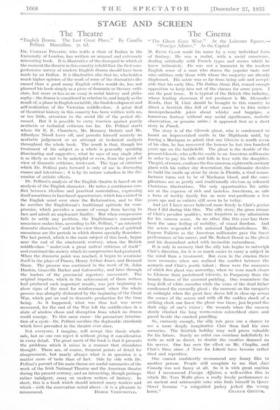STAGE AND SCREEN The Theatre •
"English. Drama. The Last Great Phase." By Camillo .Pellizzi. Macmillan. 7s. fid.
DR. CAMILLO PELLIZZI, who holds a chair of Italian in the University of London, has written an unusual and extremely interesting book. It is illustrative of the disregard in which at the moment the theatre in this country i8 held that the first com- prehensive survey of modern English drama 'should have been made by an 'Italian. It is illustrative alSb that he, who holds a much higher opinion of the work of some of the dramatists dis- cuSSed than a good many English critics would do, has not planned his book simply as a piece of dramatic or literary criti- cism, but more or less as an essay in social history and philo- sophy: the drama is considered in relation to, and largely as the result of, a phase in English social life, the final development and self-realisation of the Victorian middle-class. A great deal of theatrical history in this country has been written with no, or too little, attention to the social life of the period dis- cussed. But it is possible to carry reaction against purely aesthetic or technical criticism too far. Dr, Pellizzi starts where Sir E. K. Chambers, Mr. Bonamy Dobree and Mr. Allardyee :Nicoll leave off, and permits himself scarcely an aesthetic judgement or an attempt' at technical analysis throughout the whole book. The result is that; though his treatment of his subject as a whole is generally speaking illuminating and .suggestive, what he says of any single play is as likely as not to be unhelpful or even, from the point of view • Of dramatic criticism, irrelevant. The type of criticism Which Dr. Pellizzi puts forward is only of use in discussing valises and intentions ; it is by its nature valueless in the dis- Ctitsion of artistic effects.
Dr. Pellizzi's analysis of the English theatre is based on an analysis of the English character. He notes a continuous con- flict between idealism and nractical materialism, expressing itself sometimes in barefaced opportunism, which has existed in the English mind ever since the Reformation, and to this he ascribes the Englishman's traditional aptitude for com- promise, which provides a means of escape from having to face and admit an unpleasant finality. But when compromise fails to settle any problem, the Englishman's consequent uneasiness makes him, according to Dr. Pellizzi, "an intensely dramatic character," and in his view these periods of spiritual uneasiness are the Periods in which drama specially flourishes. The last period, which is the main subject of this book, began near the end of the nineteenth century, when the British Middle-class " undertook a great radical criticism of itself" and examined the Society which its compromises had produced. When the dramatic point was reached, it began to scrutinise itself in the plays of Pinero, Henry Arthur Jones, and Bernard Shaw. The process was continued in the work of St. John Nankin, Granville Barker and Galsworthy, and later through the leaders of the provincial repertory movement. The original impetus, Which in the achievement of these writers had produced such important results, was just beginning to show signs of the need for reinforcement when the whole process was abruptly dislocated by the beginning of the Great War, which put an end to dramatic production for the time being. As it happened, what was thus lost was never recovered, for the end of the War left the middle-class in a state of aimless chaos and disruption from which no drama could emerge. To this same cause—the premature termina- tion of a cycle—Dr. Pellizzi ascribes the deplorable standards which have prevailed in thc theatre ever since.
Not everyone, I imagine, will accept this thesis whole- sale, but no one can reject it without giving it consideration in every detail. The great merit of the book is that it presents the problems which it raises in a manner that stimulates thought. There are, of course, frequent points of detail for disagreement, but nearly always whet is in question is a matter more of taste than of fact. Side by side with Dr. Pellizzi's pursuit of his main theme are useful summaries of the work of the Irish National Theatre and the American theatre daring the present century, and an interesting, though perhaps rather indulgent, essay on Modern ..writers of fantasy. In short, this is a book which should inter* many readers and which—with the reservation noted above—it is a pleasure to


































 Previous page
Previous page